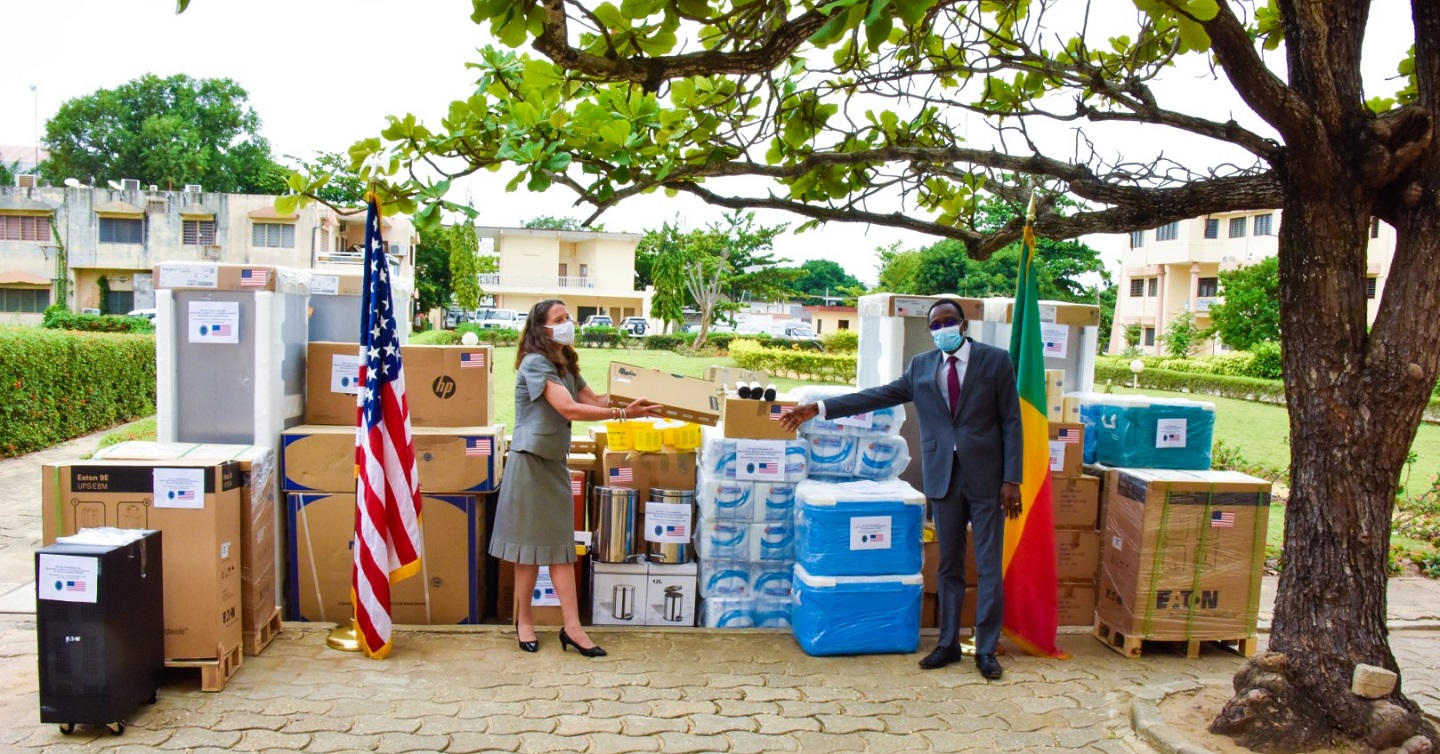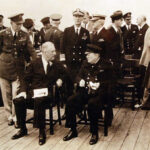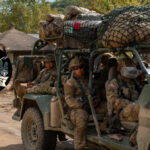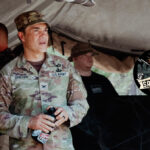
EDITOR’S NOTE: This episode was recorded before the sudden fall of Afghanistan to Taliban forces, making some of the thoughts of women’s influence in the region and human security even more important to consider.
Regardless of whether conflict occurs between state or non-state actors, is conventional or irregular there is one constant: there is always a population of citizens that suffers in one way or another. Warfare often focuses on the enemy’s ability to fight, mobilize, resupply or defend. Sarah Petrin is in the virtual studio today and she wants to focus the discussion on Human Security. She joins our Editor-in-Chief Jacqueline Whitt to discuss the protection of civilians; women, peace and security; sexual exploitation and abuse; human rights; and peace operations. She wants to make sure these topics aren’t forgotten in the complex world of operations that the DoD must engage in. Her white paper Human Security in U.S. Military Operations: A Primer for DOD is the basis of the conversation.
I think that human security becomes more real when you apply it to a specific place and then you can see where you need to shift operations
Podcast: Download

Human Security in U.S. Military Operations: A Primer for DOD
Sarah Dawn Petrin is a former Peace Operations and Human Security Analyst at the U.S. Army Peacekeeping and Stability Operations Institute. She has advised the U.S. military and NATO on developing strategy, policy, and doctrine for the Protection of Civilians and Women, Peace, and Security. She has twenty years of operational experience in conflict zones in Africa, Asia, Eastern Europe, and the Middle East. Her first book, BRING RAIN: Helping Humanity in Crisis, was released in March 2021.
Jacqueline E. Whitt is an Associate Professor of Strategy at the U.S. Army War College and the Editor-in-Chief of WAR ROOM.
The views expressed in this presentation are those of the speakers and do not necessarily reflect those of the U.S. Army War College, U.S. Army, or Department of Defense.
Photo Description: The United States government, through U.S. Africa Command (AFRICOM), is proud to contribute $60,000 in equipment and supplies to support the Ministry of Health’s efforts to expand Beninese COVID-19 testing capacity by establishing diagnostic laboratories in Kandi and Lokossa.
This assistance is in addition to the $4.5 million that the United States government, through USAID, contributed in April to limit the spread of COVID-19 in Benin.
Photo Credit: Courtesy of the U.S. Embassy in Benin





One must look at such things as the current emphasis on the “the individual” and “human security” — and such related matters as R2P today — this more from the perspective of:
a. The U.S./the West winning the Old Cold War and then
b. Market forces moving out smartly to try to capitalize upon and consolidate the potential market gains made possible by our winning this such “war;” this by:
1. Both here at home and there abroad, our working hard to transform the states and societies the world (again, to include our own); these, along more “market compatible” lines; this,
2. So that these states and societies might be made to better interact with, better provide for and better benefit from such things as capitalism, globalization and the global economy.
It is from this such “market” perspective — I suggest — that we might best understand:
a. The emphasis on such things as “the individual” and “human security” today and
b. The clash that advocates of this such approach and effort have (again, both here at home and there abroad) with those who are more concerned with such things as (a) “the group” and/or “the nation” and (b) “group” and/or “national” security.
Bottom Line Thought — Based on the Above:
From the “market” perspective that I attempt to provide above, “groups” and/or “nations” — with their emphasis on “group” and/or “national” rather than “market” security — these such entities are seen, in certain cases, as one of the main obstacles that, at the end of the Old Cold War, markets understood that they had to find a way to overcome.
Thus, post-the Cold War, the promotion by the development/the globalization/the market community (and those governments working for same) of such things as R2P — an approach which is designed to provide that markets might (a) breach nation-state “sovereignty;” this, so as to (b) accomplish market goals.
As someone who is obviously much better than yours truly; this, at explaining the “conflict environment” (individual/human security versus group/national security) that I attempt to describe above, consider the following from Walter Russell Meade:
“Over the past quarter century, Western policymakers became infatuated with some dangerously oversimplified ideas. They believed capitalism had been tamed and would no longer generate economic, social, or political upheavals. They felt that illiberal ideologies and political emotions had been left in the historical dustbin and were believed only by ‘bitter’ losers’–people who ‘cling to guns or religion or antipathy toward people who aren’t like them… as a way to explain their frustrations,’ as Barack Obama famously put it in 2008. Time and the normal processes of history would solve the problem; constructing a liberal world order was simply a matter of working out the details.
Given such views, many recent developments–from the 9/11 attacks and the war on terrorism to the financial crisis to the recent surge of angry nationalist populism on both sides of the Atlantic–came as a rude surprise. It is increasingly clear that globalization and automation have helped break up the socioeconomic model that under-girded postwar prosperity and domestic social peace, and that the next stage of capitalist development will challenge the very foundations of both the global liberal order and many of its national pillars.
In this new world disorder, the power of identity politics can no longer be denied. Western elites believed that in the twenty-first century, cosmopolitanism and globalism would triumph over atavism and tribal loyalties. They failed to understand the deep roots of identity politics in the human psyche and the necessity for those roots to find political expression in both foreign and domestic policy arenas. And they failed to understand that the very forces of economic and social development that cosmopolitanism and globalization fostered would generate turbulence and eventually resistance, as ‘Gemeinschaft’ (community) fought back against the onrushing ‘Gesellschaft’ (market society), in the classic terms sociologists favored a century ago.”
(See the Mar-Apr 2017 edition of “Foreign Affairs” and, therein, the article by Meade entitled “The Jacksonian Revolt: American Populism and the Liberal Order.”)
Bottom Line Thought — Based on the Above:
If “market society” is determined to “mess with the bull” — that is, to mess with “community” both here at home and there abroad — for example, by promoting ideas such as “human security” both here at home and there abroad —
Then “market society” must be prepared — both here at home and there abroad — to “get the horns.”
(It is from this such perspective, might we agree, that both Sep 11, 2001, and Jan 6, 2021, is best understood?)
One additional thought may prove useful here:
If the Soviets/the communists had won the Old Cold War, then they — much like the U.S./the West after 1991 — might have determined that they (in order to capitalize upon and consolidate potential gains) needed to find a way to (a) breach nation-state sovereignty; this, so as to (b) cause the transformation/the further transformation of the states and societies of the world; these, (c) more along “modern” (in this case Soviet/communist) political, economic, social and/or value lines.
In order to do this, it is likely that the Soviets/the communists (with the U.N.’s help in this case also?) might have proposed/adopted something like R2P.
In this regard, it is likely that the Soviets/the communists — as justification — might have used terms such as “human security.” (Although, in this such “the Soviets/the communists win” instance, [a] what “human security” looked like, this would have been, of course, [b] determined/defined/described more along Soviet/communist political, economic, social and/or value lines?)
From this such perspective, the “wars” that the U.S./the West has had to fight post-the Old Cold War — both against “conservative”/”no change” hold-outs within our own borders and elsewhere overseas — these are likely to have been the same type of “wars” that the Soviets/the communists would have had to fight — in this instance, against “conservative”/”no change” holdouts within their borders and elsewhere?